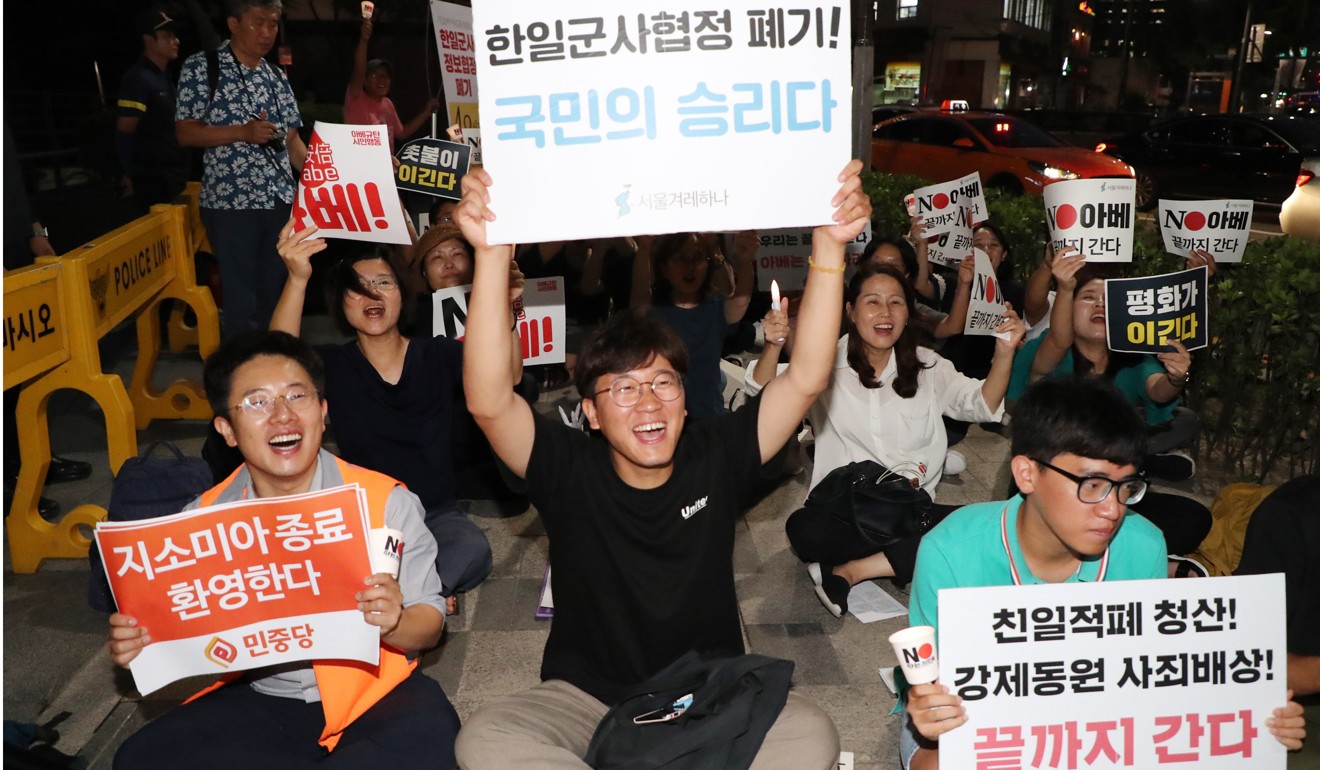
China, US seek to minimise fallout amid worsening South Korea-Japan trade feud
- Seoul says it may reconsider move to end military intelligence pact with Tokyo if preferential trade status is reinstated – but Tokyo refuses
- Beijing’s priority is protecting its economic interests, while Washington is focused on security, observers say
With the bitter trade rift between Seoul and Tokyo showing no sign of improving, Beijing and Washington are seeking to protect their economic and security interests from the fallout, according to observers.
On Tuesday, South Korean Prime Minister Lee Nak-yeon said Seoul’s decision to terminate its military intelligence-sharing pact with Tokyo – the General Security of Military Information Agreement – may be reconsidered if Japan put the country back on its list of preferred trade partners.
Seoul announced it would end the treaty last week in response to Tokyo removing South Korea from its “white list” of countries with preferential trade status, a move that takes effect on Wednesday.
But Tokyo dismissed Seoul’s proposal, with Hiroshige Seko, Japan’s trade minister, saying there would be no change to the trade list decision.
The seeds of the trade row lie in a dispute between Seoul and Tokyo over the legacy of Japan’s colonial rule over the Korean peninsula prior to the end of World War II. Tokyo, which believes it settled all necessary compensation under a treaty signed in 1965, was angered by a South Korean court’s recent order that Japanese firms must compensate wartime victims of forced labour, while Seoul believes that a victim’s right to file an individual claim has not expired.
As the row continues to worsen, with neither side appearing willing to make concessions, Beijing and Washington are trying to minimise its impact as they seek to curb each other’s influence in the region, according to observers.
They said Beijing’s priority was the economy and it was trying to push forward a free-trade deal between China, South Korea and Japan, amid the increasing protectionism of the US under President Donald Trump.
Washington, meanwhile, was focused on security, since a further escalation of tension could affect its China containment strategy in East Asia – the trilateral alliance with South Korea and Japan.
Zhang Baohui, director of the Centre for Asian Pacific Studies at Lingnan University in Hong Kong, said given the weakening of that system and the rise of protectionism, “the three countries, which have export-oriented economies, all face the same challenge – and that should give the idea of trilateral economic integration a boost”.
“However, economics is always linked to politics. The current political spat between Japan and South Korea may dampen progress,” he said.
Beijing was less worried about security, according to Zhang. He said Beijing was confident that the alliance between Japan, South Korea and the United States was “politically unlikely”.
“South Korea has always been very careful with its security cooperation with Japan, and unwilling to antagonise China. Moreover, there has always been a high degree of strategic mistrust between South Korea and Japan,” he said.

In contrast, the US – after initially distancing itself from the trade dispute – weighed in when Seoul said it would terminate the information-sharing pact, in a bid to limit the impact of the conflict, with Secretary of State Mike Pompeo saying that Washington was “disappointed”.
The agreement signed in 2016 enables three-way intelligence gathering between the US and its two allies and provides a crucial framework for coping with North Korea’s nuclear and missile threats.
Timothy Heath, a senior international defence researcher at the Rand Corporation, said Seoul’s move would weaken the US alliance network and embolden China and North Korea.
“With the US allies feuding with one another, Pyongyang may well judge that the opportunity is growing for more provocative actions that could yield concessions,” he said.
“The sharing pact was an important step in US efforts to build trilateral cooperation between Japan and South Korea. It signalled a growing united front between the three powerful allies.”
Explained: what’s driving Japan’s escalating feud with South Korea?
Meanwhile, US security analysts warned that economic integration with China could involve political risk.
Bruce Bennett, also a senior international defence researcher at the Rand Corp, noted the economic pain inflicted on South Korea by China after a US missile shield was rolled out.
“When the United States deployed the THAAD missile defence system in South Korea, China decided to wage economic warfare against South Korea in order to force the South to expel THAAD,” Bennett said. “I have seen a number of estimates that suggest that this Chinese economic warfare cost South Korea tens of billions of dollars.”
Beijing imposed informal economic sanctions on Seoul over its decision in 2016 to deploy the Terminal High Altitude Area Defence system, an American array of radar and interceptor missiles designed to spot and knock out incoming ballistic missiles. Seoul said the system was meant to deter threats from North Korea, but Beijing saw THAAD as a security threat because it could be used to monitor China’s military facilities.
China’s response included a boycott of South Korean companies and their products – including the Lotte conglomerate’s retail operations on the mainland – and a ban on group tours to the country.
“Decades ago, we talked about the peaceful rise of China, but this example illustrates the fact that China will be seeking at least influence over its neighbours and potentially to dominate its neighbours,” Bennett said. “It is therefore critical to sustain US alliances and partnerships in East Asia to maintain the independence of these countries and US access to roughly one-third of its international trade.”

